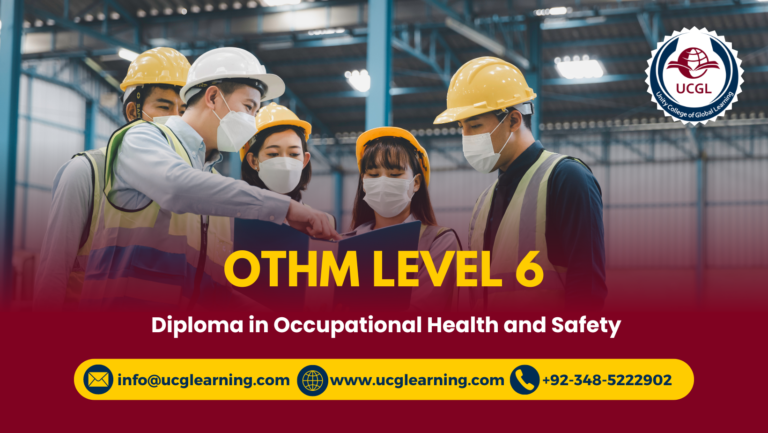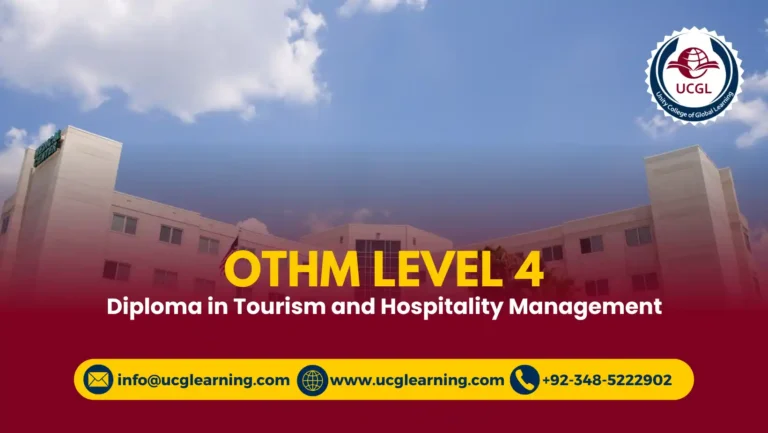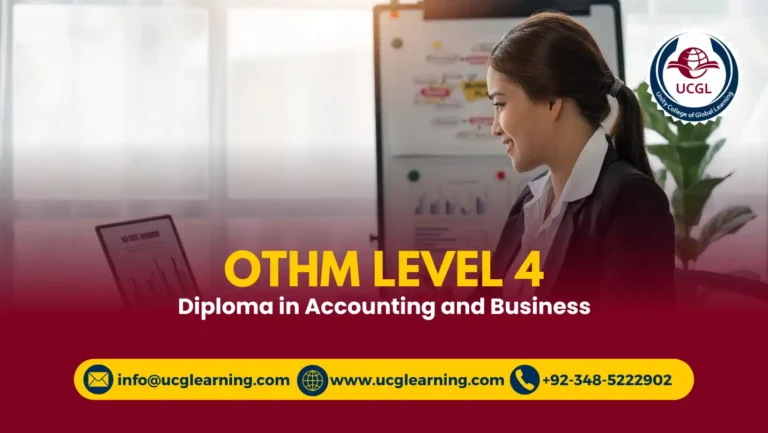OTHM Level 7 Diploma in Business and Organisational Psychology
The OTHM Level 7 Diploma in Business and Organisational Psychology is a comprehensive program designed to equip professionals with advanced knowledge and skills in psychology as applied to business and organizational contexts. This diploma integrates psychological theories and principles with practical business applications, preparing individuals to enhance organizational performance, employee well-being, and leadership effectiveness.
Course Introduction
The OTHM Level 7 Diploma in Business and Organisational Psychology focuses on the intersection of psychology and business, offering insights into human behavior, motivation, and organizational dynamics. Participants delve into topics such as leadership development, employee engagement, organizational culture, and strategic decision-making through a psychological lens.
Course Benefits
- Advanced Psychological Expertise: Gain specialized knowledge in applying psychological theories and practices to business environments.
- Enhanced Leadership Skills: Develop leadership capabilities to manage teams effectively and drive organizational change.
- Employee Well-being: Promote psychological health and well-being in the workplace, fostering a positive organizational culture.
- Strategic Decision-Making: Utilize psychological insights to inform strategic decisions and improve organizational outcomes.
- Career Advancement: Enhance career prospects with a recognized qualification at the postgraduate level in business psychology.
Course Study Units
- Health, Work and Stress (20 credits)
- Motivation, Job design, and extrinsic rewards (20 credits)
- Organisational development and change (20 credits)
- Leadership and Management style (20 credits)
- Team building (20 credits)
- Research design in business psychology (20 credits)
Learning Outcomes
Health, Work and Stress (20 credits)
- Understanding Health in Organizations: Analyze the impact of organizational factors on employee health and well-being.
- Stress Management: Develop strategies to identify, mitigate, and manage workplace stressors effectively.
- Work-Life Balance: Promote practices that support work-life balance and enhance employee satisfaction and productivity.
- Psychological Resilience: Foster psychological resilience and coping mechanisms among employees facing work-related stressors.
- Organizational Policies: Recommend organizational policies and practices that promote a healthy work environment.
Motivation, Job Design, and Extrinsic Rewards (20 credits)
- Motivational Theories: Apply motivational theories to enhance employee engagement, satisfaction, and performance.
- Job Design Principles: Design and redesign jobs to optimize employee motivation and job satisfaction.
- Extrinsic Rewards Strategies: Develop and implement reward systems that align with organizational goals and motivate employees.
- Performance Management: Evaluate the effectiveness of motivational strategies and adjust approaches based on performance outcomes.
- Employee Recognition: Implement programs to recognize and reward employee contributions effectively.
Organisational Development and Change (20 credits)
- Organizational Diagnosis: Assess organizational needs and readiness for change using diagnostic tools and techniques.
- Change Management Strategies: Plan, implement, and evaluate change initiatives to foster organizational development.
- Stakeholder Engagement: Engage stakeholders at all levels to support and facilitate organizational change efforts.
- Culture Transformation: Lead efforts to transform organizational culture to align with strategic objectives and enhance performance.
- Sustainability: Ensure the sustainability of organizational development efforts through continuous evaluation and adaptation.
Leadership and Management Style (20 credits)
- Leadership Theories: Evaluate leadership theories and models to enhance leadership effectiveness and style.
- Adaptive Leadership: Develop adaptive leadership skills to respond to diverse organizational challenges and contexts.
- Management Styles: Assess and adapt management styles to optimize team performance and organizational outcomes.
- Decision-making: Apply effective decision-making processes and strategies to guide organizational success.
- Ethical Leadership: Demonstrate ethical leadership practices that inspire trust, respect, and organizational integrity.
Team Building (20 credits)
- Team Dynamics: Analyze team dynamics and factors influencing team effectiveness and cohesion.
- Team Development: Facilitate team development activities to enhance collaboration, communication, and performance.
- Conflict Resolution: Implement strategies to manage and resolve conflicts within teams constructively.
- Virtual Teams: Manage virtual teams effectively, leveraging technology to foster teamwork and achieve shared goals.
- Team Leadership: Provide effective leadership within teams to motivate, guide, and empower team members.
Research Design in Business Psychology (20 credits)
- Research Methodologies: Select and apply appropriate research methodologies and designs in business psychology.
- Data Collection and Analysis: Collect, analyze, and interpret qualitative and quantitative data using research methods.
- Literature Review: Conduct comprehensive literature reviews to inform research design and contribute to knowledge development.
- Ethical Considerations: Address ethical considerations in research design and practice, ensuring research integrity and participant well-being.
- Research Proposal: Develop and present a research proposal that demonstrates a clear research question, methodology, and theoretical framework.
These learning outcomes equip participants with advanced skills and knowledge in business psychology, enabling them to address complex organizational challenges, enhance workplace dynamics, and drive organizational success through effective leadership, motivation, team building, and organizational development strategies.
Who is This Course For?
The OTHM Level 7 Diploma in Business and Organisational Psychology is suitable for:
- HR Professionals: Seeking to deepen their understanding of human behavior in organizational settings.
- Leaders and Managers: Wishing to leverage psychology to enhance leadership effectiveness and team performance.
- Consultants and Coaches: Specializing in organizational development, change management, and employee engagement.
Future Progression
Completion of this diploma opens doors to various career advancement opportunities:
- PhD or Doctoral Studies: Progress to further academic studies in psychology, organizational behavior, or business administration.
- Senior Leadership Roles: Advance to senior management positions such as HR Director, Organizational Psychologist, or Change Management Specialist.
- Consultancy and Coaching: Specialize in providing psychological consultancy or coaching services to organizations.
- Research and Academia: Pursue research opportunities or teaching positions in business psychology and organizational behavior.
OTHM Level 7 Diploma in Business and Organisational Psychology equips professionals with the specialized knowledge and skills needed to navigate complex organizational challenges through psychological insights and strategies. Embrace this opportunity to unlock your potential, drive organizational success, and make a positive impact on workplace culture and performance through applied psychology.







